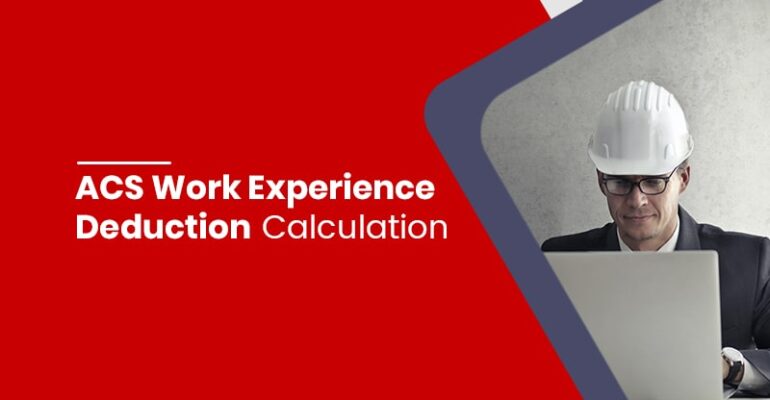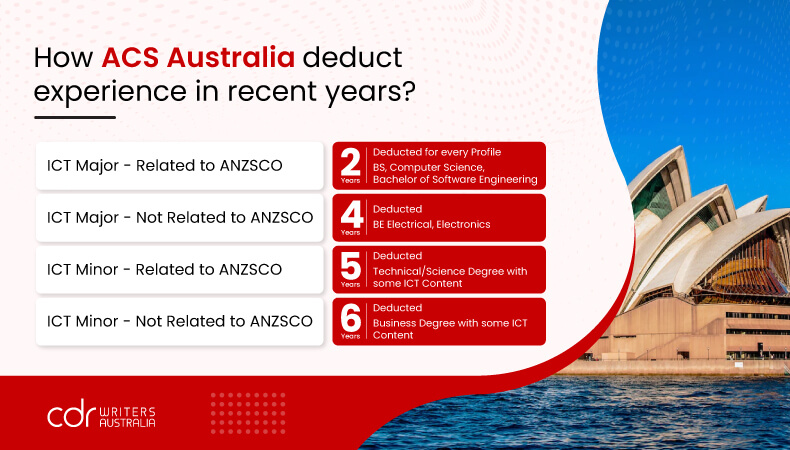ACS Work Experience Deduction Calculation

ACS Work Experience Deduction Calculation
The ACS (Australian Computer Society) is the official organization that evaluates your qualifications, job experience, and expertise in the ICT industry if you wish to relocate to Australia. Professionals from another country who do not have an ICT degree, i.e., tertiary credentials or insufficient ICT qualifications, must demonstrate their knowledge and abilities to ACS by completing an RPL report form for ACS skill assessment.
ACS skill assessment is one of the most crucial certifications for individuals wishing to migrate to Australia; hence, they must obtain a PR skill assessment. There are several ACS skill assessment qualifications and various ACS eligibility requirements. If you want to come to Australia as an IT specialist in an ICT-related industry, you must have the indicated skill to be examined before immigration.
Read More: Best tips to prepare an ACS RPL report for business analysts. 🤩🤩
To meet the eligibility criteria, you must have at least two years of relevant work experience, either before or after finishing your bachelor’s degree. The date when the skill level requirement was met is indicated on your ACS result letter and determined by the suitability criteria’ outcome.
All relevant work experience gained after the date on which the skill level requirement was met is considered skilled employment and is eligible for points under the skilled migration points test. Work experience necessary to fulfill the appropriateness requirements is not regarded as professional employment and is unsuitable for the skilled migration points test.
Applicants submit recognition of prior learning reports with insufficient ICT backgrounds or no ICT degree. They must go through a skill assessment undertaken by the Australian Computer Society (ACS). If your academic background and work experience are at the ICT level, you can pass the ACS migration skills examination. For migration functions, it must be closely associated with the claimed occupation.
For migration reasons, the ACS migration skills assessment will determine if your educational credentials and work experience are at a professional ICT level and closely connected to the selected occupation (ANZSCO). An employment reference letter is a document that consists of your knowledge, skills, experiences, and assessments that test your capability to perform various tasks under pressure. A well-written reference letter will help in achieving a positive outcome.
- Determines how much work experience is needed to satisfy the suitability requirements. Requirements, course groups, and career episodes are evaluated to ascertain whether it is an ICT professional unit.
- This assessment result will confirm if the certification is a Major, Minor or whether the ICT material is inadequate.
- Only occupations closely linked to ICT units are evaluated.
- Employment episodes are also assessed to see if they are relevant to the nominated career.
Employment Reference Letter Format
Candidates must include a work reference letter from their previous company with their RPL report. The employment reference letter includes your educational credentials, professional experience, talents, and competence. The ACS will evaluate your RPL report based on your work history and experience.
Work experience at a professional ICT level and related to the desired occupation is required for the migration skills evaluation to be appropriate.
Skilled Employment
Only remunerated work with a minimum of 20 hours per week can be evaluated for competence. The employment to be evaluated must be of sufficient depth and complexity for the selected occupation. The salary should be appropriate for the degree of expertise necessary. Unpaid or partially paid leave or volunteer activities will not be deemed paid work at the requisite skill level of a specified occupation for skills assessment.
Only work done after you’ve fulfilled the ACS eligibility requirements will be classified as “skilled employment” and qualify you for migration points. Work experience utilized to fulfill the suitability requirements is not considered skilled employment and is not eligible for migration points.
Learn More: Benefits of ACS RPL writing services for engineers. 💪💪
Employment reference letter rules to follow.
1. Date of Employment Period
The start and end dates of the employment should be written in a DD/MM/YY format. If you are currently working, your end date should represent ‘To Date’ along with the date the reference was written.
2. Duties Performed
All the duties and responsibilities performed by the applicant must be described in detail. Make sure your duties are related to the ANZSCO code occupation you select.
3. Total Working Hours
Whether you dedicate your employment period to a full-time or part-time job, you must mention it correctly in your reference letter. You have to reach the minimum limit of twenty hours per week.
4. Country of Employment
Details of the country where the employment was taken If you have worked for various companies in different countries, mention the duration and location of your employment.
5. Organization Letterhead and signature
Your employment letter must be genuine, requiring a signature from authorized personnel on the organization’s letterhead. The person’s name, job title, and contact number must be appropriately included.
6. Certification
An approved notary must certify the employment reference letter as a true copy.
ACS work experience deduction
Here’s how ACS has deducted work experience in past years:

ACS examines your qualifications to ensure that your degrees align with Australia’s instructional system and provides authentication to ensure ICT major or minor status and your job comprehension. A constructive ACS assessment is expected to ensure that all training and practice are dedicated to the Australia PR application.
The Australian Computer Society will subtract a minimum of two years of work experience as training time. The actual number of years deducted from work experience is six or eight. However, the number of years to be excluded is determined by various considerations, including work experience unrelated to professional degrees.
Factors for deducing Work Experience
The overall deduction of work experience ranges from 2 to 8 years based on the factors mentioned below. Any reasons that influence ACS’s deduction of your work experience are as follows:
- If the qualifications, duties, and roles you’ve listed do not correspond to the ANZSCO code you chose.
- The year you received your bachelor’s or master’s degree.
- The field in which specialized your profession.
- Significance and type of work experience, as well as skills gained in the workplace
- Is your degree major or minor, and does it have a solid connection to your job field and ANZSCO code?
Furthermore, whether you already have an Australian degree, ACS-eligible years, or both, you will have an advantage because your work experience will not be deducted.
The technical assistance you request must have a good track record with effective ACS evaluations. Many reputable websites provide genuine experts’ expertise to assist you with your RPL and ACS submission. As a result, it is brilliant to employ a professional writer with RPL report writing and paper submission skills to prepare the RPL report.
Read More: Get familiar with the KA02 Report and its significance for ICT applicants. ✌️✌️
Example for your reference
Assume you have a bachelor’s degree in computer science or engineering, or another ICT major that is loosely related to the ANZSCO code. You finished your certification on December 31, 2001, and you have four years of related work experience from January 1, 2002, to December 31, 2006.
According to the ACS suitability guidelines, two years of work experience are deducted in this process. As a result, your “Skill Requirement Met” date will begin on December 31, 2004. Since 2004, professional roles have been considered skilled jobs and are eligible for skilled migration point testing.
A total of four years of work experience are deducted from your work experience if you have a bachelor’s degree with an ICT major. Still, it is not linked to an ANZSCO code, such as BE in electrical electronics. Electrical and Electronics Engineering is called an ICT major since this profession involves at least 25% of ICT subjects.
Graduates with non-computer science experience are known to have an ICT minor and a related ANZSCO code. They are classified as ICT minors and have little to do with the ANZSCO code. Their career experience is reduced by a total of five years. A total of six years is deducted for MBA or other degree graduates.
ACS ‘AFTER’ Start Date
The crucial point is the “after month” listed in the ACS capability assessment report. ACS does not decide which date to use in your Australia SkillSelect EOI (Expression of Interest). According to the ACS guidelines, you will use the date you filed your ACS application in your EOI.
Conclusion
To conclude, the RPL report will play an empirical role in the approval of skilled migration by the ACS. As a result, hiring a specialist in this field with years of experience producing RPL reports is a good idea. Our experts have years of experience in this field and a track record of delivering dependable results.
CDR Writers Australia does not make empty promises. On time, we deliver the RPL report for ACS. We also offer RPL review, editing, proofreading services, and plagiarism detection and removal with a 100% approval rate.

